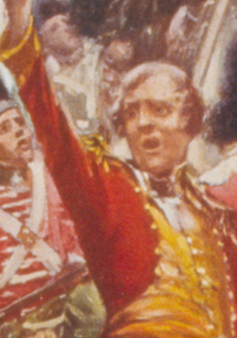Related Research Articles

Major General Robert Henry Wynyard was a British Army officer and New Zealand colonial administrator, serving at various times as Lieutenant Governor of New Ulster Province, Administrator of the Government, and was the first Superintendent of Auckland Province.

Lieutenant-General John Keane, 1st Baron Keane was an Irish soldier, whose military exploits in the First Anglo-Afghan War led to him being created Baron Keane of Ghuznee.
General Hon. John Chapple Norton was a British Army officer who served in the American Revolutionary War and who later became a Member of Parliament for Guildford.
Lieutenant General Richard Stovin was a British Army officer during the late eighteenth and early nineteenth centuries. He originally joined the army as an ensign in 1780, and saw service in the American War of Independence, where he may have been taken prisoner after the Battle of Yorktown. After the outbreak of the French Revolutionary Wars, he saw service with a force sent to invade French colonies in the Caribbean, and was taken prisoner in 1794 at Guadeloupe. Released after two years in captivity, he later commanded his regiment in the Netherlands, in the Anglo-Russian invasion of Holland of 1799, and on garrison duties in the Mediterranean and in India. In the War of 1812 he was appointed to command a division in the forces in Canada, where an island in the St. Lawrence river was named after him.

George Reade, of Shipton-under-Wychwood, Oxfordshire, was a British Army officer and Whig politician who sat in the House of Commons from 1722 to 1734.
General Sir Philip Honywood KB was a British Army officer.
Francis Columbine was a British Army officer and Governor of Gibraltar.
General the Honourable John Fitzwilliam was a British Army officer.
Lieutenant-General Edward Pole was an officer of the British Army.
Lieutenant-General John Folliot or Folliott was an officer of the British Army.
Lieutenant-General Thomas Howard was an officer of the British Army and the ancestor of the family of the present Earls of Effingham.
Major-General John Moyle was an officer of the British Army.

Gen. Sir Josiah Champagné was a British military commander who was the fifth General Officer Commanding, Ceylon. He was appointed in February 1799 until 1799. He was succeeded by Hay MacDowall.
Lieutenant-General Thomas Meredyth or Meredith, of Chelsea, Middlesex, was an Irish officer of the British Army and a politician who sat in the Parliament of Ireland from 1703 to 1719 and as a Whig in the British House of Commons from 1709 to 1710..
General John Thomas Hill was a senior British Army officer.
Lord George Bentinck (1715–1759) was a British Army officer and Member of Parliament (MP).
Lord Mark Kerr was a Scottish-born professional soldier, who served in the War of the Spanish Succession and the War of the Quadruple Alliance. He reached the rank of General in the British Army, and held a number of important administration posts, including Governor of Edinburgh Castle.
General Sir Alexander Leith, KCB was a Scottish officer in the British Army.
The 88th Regiment of Foot was an infantry regiment in the British Army from 1779 to 1783, formed during the American Revolutionary War. It was raised in Worcestershire under Colonel Thomas Keating and saw service in Jamaica. It was disbanded in England in 1783 at the end of the war.
General Lowther Pennington, 2nd Baron Muncaster was a British Army general who saw active service during the American Revolution and the French Revolutionary Wars. Pennington seems to have been frequently at odds with his fellow officers: his arrival in America was signalized by a duel with the Royal Navy captain who brought him over, and in 1793, he was publicly reprimanded by the Duke of York for court-martialing an adjutant over a trifle. After thirty years of service in the Coldstream Guards, he received the colonelcy of the 131st Regiment of Foot in 1795, only for it to be disbanded the next year. He married late in life, in 1802, and promptly had one son. His last command was a Royal Veteran Battalion in 1806, which he resigned in 1813 upon inheriting his brother's barony and estates, dying five years later.
References
- Richard Cannon, Historical Record of the Seventeenth, of the Leicestershire Regiment of Foot (1848) p. 51
- Charles Dalton, English Army Lists and Commission Registers 1661-1714, volume V (1902) p. 175-176, note 15